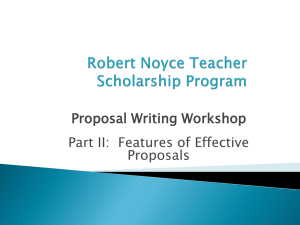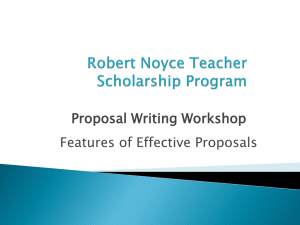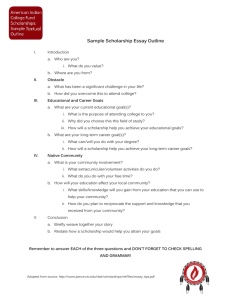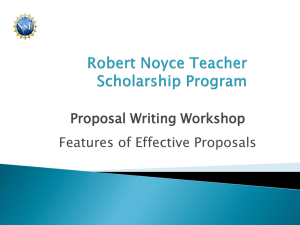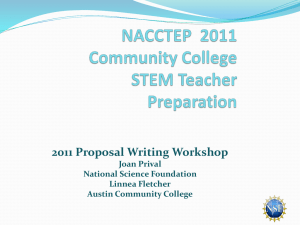Noyce AAAS Breakout session Scholarship Track 2014
advertisement
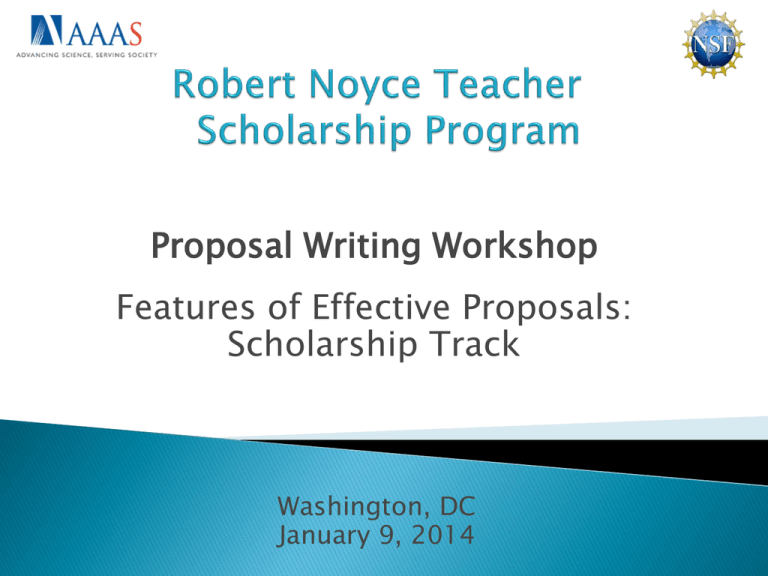
Proposal Writing Workshop Features of Effective Proposals: Scholarship Track Washington, DC January 9, 2014 Use two “sample” proposals to discuss ways to put together effective proposals ◦ Capacity building (1240007) and ◦ Full scholarship (1240064). Highlight general tips for NSF proposal writing Active “Working” Workshop Small and large group interactive discussions (Read )Think Share Report Learn (TSRL) Consider two types of Scholarship proposal (Full and Capacity-building) Focus on guidelines for Project Description provided in program solicitation Goal- recruit STEM majors/ career changers who might not otherwise have considered a career in K-12 teaching Scholarships - undergraduate STEM majors preparing to become K-12 teachers Internships - freshman/ sophomores Stipends for STEM professionals seeking to become K-12 teachers Results from prior NSF support Proposed scholarship program Description - teacher preparation program Recruitment activities Selection process Management / administration Support for new teachers Collaboration / partnerships Monitoring / enforcing compliance Evidence for institutional commitment Evaluation plan Capacity and ability of institution Number and quality of students in program Justification for number & amount of stipend Ability of the program to recruit STEM majors not otherwise pursuing a teaching career Quality of recruitment & marketing strategies Quality of the preservice educational program Extent of collaboration between STEM & Ed faculty Quality of student and new teacher support structure Extent to which proposal is based on evidencebased pedagogies Feasibility & completeness of an evaluation plan Is sufficient information provided about the numbers, size of scholarship/stipend, and activities to convince you that this would be a strong scholarship program? In what ways has PI most effectively documented the quality of the teacher preparation program? Is the proposed program likely to enable scholarship recipients to become successful teachers? What aspects of recruitment do you think are the most likely to be effective? (why?) Will plan be effective in recruiting STEM majors who might not otherwise consider a career in teaching? Will selection process effectively identify ‘best’ candidates for the scholarships? Will planned induction support adequately meet the needs of new teachers? Will plan provide useful information about important program outcomes? Four features, divided among the tables: Management & administration Collaboration & partnerships and evidence of institutional commitment Monitoring & enforcing compliance Results from prior NSF support In your Jigsaw Groups Read the proposal (15 minutes) Discuss the questions Decide on main points to report to group Report out! What aspects of the administration and management plan did the most to convince you that the project will be well run? Has the PI persuaded you that the collaboration and partnerships will function? Individuals from all participating institutions have clear roles and structures for communication Management plan includes a description of how communication, meetings, roles, division of responsibilities, and reporting will occur Distribution of resources is appropriate to the scope of the work All partners contribute to the work and benefit from it Letters of commitment are provided from non-lead partners (consult the solicitation for which letters are required, and which are optional) Consider information provided about institutional commitment. What other evidence could a PI use to demonstrate that the sponsoring institution is committed to making the program a central institutional focus? Is the institution committed to sustain some aspects of the supported effort? Consider the monitoring/enforcing compliance strategies presented in the proposal. Are these plans likely to be effective? Does the proposal adequately address prior support? Does the new project use infrastructure developed with other support? Do the various projects synergize to amplify the individual impact of each? Consider descriptions of criteria for intellectual merit / broader impact and additional review criteria for the Noyce Phase 1 Proposals How does the proposal address these criteria? For the program for which you are seeking funding, describe the intellectual merit and the broader impact. To establish the infrastructure and partnerships for implementing a future Noyce Teacher Scholarship or NSF Teaching Fellowship project Develop new teacher preparation programs for STEM majors and STEM professionals Develop new programs for STEM Master Teachers Results from prior NSF support Description of the activities planned, timeline, and outcomes expected to result from the proposal Plans for evaluating progress and outcomes of the project Clarity of proposed plans and activities that will lead to a well-designed program consistent with the requirements of the Noyce Scholarship Program. Clear statement of objectives to be completed and expected outcomes of the project. Evaluation plans that will measure stated objectives and outcomes. Is there sufficient information about the proposed activities to convince you that this would lead to a well-designed program consistent with the requirements of the Noyce Scholarship program? Are the appropriate players involved? Is there a clear statement of objectives to be completed and expected outcomes of the project? Will the evaluation plans measure the stated objectives and outcomes? Does the proposal adequately address prior support? What aspects of this capacity building proposal convinced you this was the appropriate category for this proposal? What does the budget for the full proposal include that is missing from the capacitybuilding proposal? What differences in emphasis do you see between the two proposals? At what point would you say a team was prepared to submit a full proposal?
